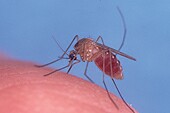
FRIDAY, Aug. 12 (HealthDay News) — Standing water is a breeding ground for mosquitoes that can spread serious diseases such as the West Nile virus. Yet many urban families don’t take simple steps such as dumping out standing water to reduce their risks, researchers say.
Last summer, researchers polled 242 urban residents to find out how much they knew about mosquitoes, mosquito-borne diseases and the risks posed by standing water, a mosquito breeding ground. Researchers also investigated the properties to determine the number and species of mosquitoes present.
About 54 percent of households had mosquitoes, according to the study presented Aug. 11 at the Ecological Society of America’s annual meeting in Austin. The two dominant species were the Asian tiger mosquito (Aedes albopictus) and the common house mosquito (Culex pipiens) — both known transmitters of the West Nile virus.
Although higher income residents knew more about mosquito-borne disease and mosquito breeding sites, the middle- and lower-income households polled were more concerned about them.
“High general knowledge of mosquitoes and concern about mosquito biting were not sufficient to encourage residents to dump standing water, and even in yards where residents did empty containers, there were still many mosquito breeding sites,” Zara Dowling, of the University of Maryland, said in a news release.
The researchers concluded that urban residents need more education and motivation to control larval mosquitoes.
“Residents could benefit from community-based education campaigns that include detailed information regarding the types of containers that can hold standing water and the frequency with which they should be emptied to help prevent mosquito-borne illness,” Dowling said.
More information
The U.S. Centers for Disease Control and Prevention provides more information on mosquito-borne diseases.

